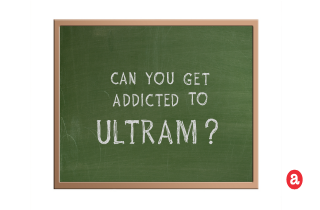Ultram = low addiction potential
Is Ultram addictive? The FDA and Ultram manufacturers say that the chances of becoming addicted to Ultram are very low if you use it for medical purposes and exactly as prescribed. But, even under appropriate medical use, the risk for becoming addicted to any opiate pain medication is real.
But, what activities increase your chances of Ultram addiction? Can you avoid it? Read more in this article, and feel free to share any additional questions in the section at the end of the page. In fact, we try to answer all real life comments with a personal response!
Psychoactive ingredients of Ultram
Ultram is a brand name for medicine that contains the generic opioid, tramadol. Tramadol belongs to the group of drugs called “synthetic opioid analgesics”, and is the main psychoactive ingredient of Ultram. This medication is intended for the treatment of moderate to moderately severe pain.
Other – mainly inactive – ingredients are found in Ultram. The number of inactive ingredients (non-psychoactive) that can be found in Ultram include:
- carnauba wax
- glycol
- hypromellose
- lactose
- magnesium stearate
- microcrystalline cellulose
- modified starch (corn)
- polyethylene
- polysorbate 80
- pregelatinized corn starch
- sodium starch glycolate
- titanium dioxide
What does Ultram do in the body?
When you take Ultram, your pain levels are muted down to the point where you can perform everyday activities without feeling drugged. Ultram is a successful pain killer and works by binding to the brain’s opioid receptors. In fact, it changes the way that the brain perceives pain, although its mechanism of action is not completely understood.
One of the most important effects of Ultram on the body is that it enhances the processing of two neurotransmitters called serotonin and norepinephrine. First, it is thought to increase the level of a neurotransmitter called serotonin. Scientists believe that serotonin regulates:
- appetite and digestion
- memory
- mood
- sexual desire
- sleep
- social behavior
This is why people who take Ultram might feel happier, in a better mood, sleepy, and experience appetite changes.
Ultram also interferes with another neurotransmitter called norepinephrine. This hormone regulates the levels of stress in a persons’ body. The release of norepinephrine causes an increase of glucose and blood flow in the blood stream, and a faster heart rate. This makes the body feel extremely energized.
How do you get addicted to Ultram?
Any abuse of Ultram for nonmedical purposes increases the possibility of addiction to Ultram. Plus, the risk of opioid addiction is increased for people with a personal or family history of substance abuse, or mental illness. Still, there are some steps you can actively take to minimize the risk of getting hooked on tramadol/Ultram.
1. Use as prescribed.
If you use Ultram as directed by your doctor, the risk of becoming addicted lowers. It is still possible that you become physically dependent on Ultram. That means that you’ll experience withdrawal symptoms if you stop using it or significantly lower your usual dose. However, dependence is not the same as addiction.
2. Do not abuse.
Avoid chewing, snorting, or injecting tramadol into your system. Also, be sure that you’re taking doses as prescribed WHEN prescribed. Do not over-dose.
3. Watch out for tolerance and report it.
It is also possible that regular users develop tolerance to Ultram. This means that you will feel the need for ever increasing quantities of Ultram to be able to achieve the same pain-relieving effect. However, as tolerance increases, so can dosage…and so can risk. Always inform your prescribing doctor when you notice that tolerance has occurred. You may need adjustments in medication dosing amounts or frequencies in order to lower tolerance again.
4. Be honest about euphoric effect.
In case you have a history of substance abuse, you should be extremely careful with this medication. Individuals with a history of drug use may feel triggered by the opiate effects of Ultram and start using it more often. So, if you notice that you’re getting high – even on a therapeutic dose of tramadol – talk about it! Taking tramadol and getting high can eventually lead to you becoming addicted.
Ways to recognize a person addicted to Ultram
There are three basic ways to recognize drug problem:
- If a person starts craving Ultram, that can be the red flag signal that s/he may be developing an addictive behavior.
- Obsessive-compulsive seeking and use of Ultram is another sign of addiction.
- Also, when a person loses control over the use of Ultram or continues to use it despite knowing the harmful consequences, it shows that they have become addicted.
How to avoid Ultram addiction
Here are some recommendations about how you can prevent the occurrence of addiction to Ultram:
- Use Ultram appropriately.
- Always follow the prescribed directions.
- Do not regulate doses of Ultram by yourself.
- Do not order Ultram online or try to obtaining from anyone else other than a trustworthy pharmacy.
- Learn about potential interactions of Ultram with other drugs, prescriptions, or alcohol.
- Never stop or change a dosing regimen without discussing with your doctor first.
- Never use another person’s prescription.
Young people face an especially high risk of Ultram drug abuse. If you are a parent of a child prescribed with Ultram, it is suggested that you follow these steps to help prevent your teen from abusing the medication.
- Talk about the dangerous consequences of abusing Ultram.
- Set rules.
- Keep Ultram in a safe place.
- Properly dispose of Ultram if any pills remain after the treatment is done.
Questions about Ultram dependency
Do you have any additional questions regarding Ultram’s addictive potential? We welcome all your inquiries in the comments section below. We will try to provide you with a personal answer as quickly as we can.









Related Posts